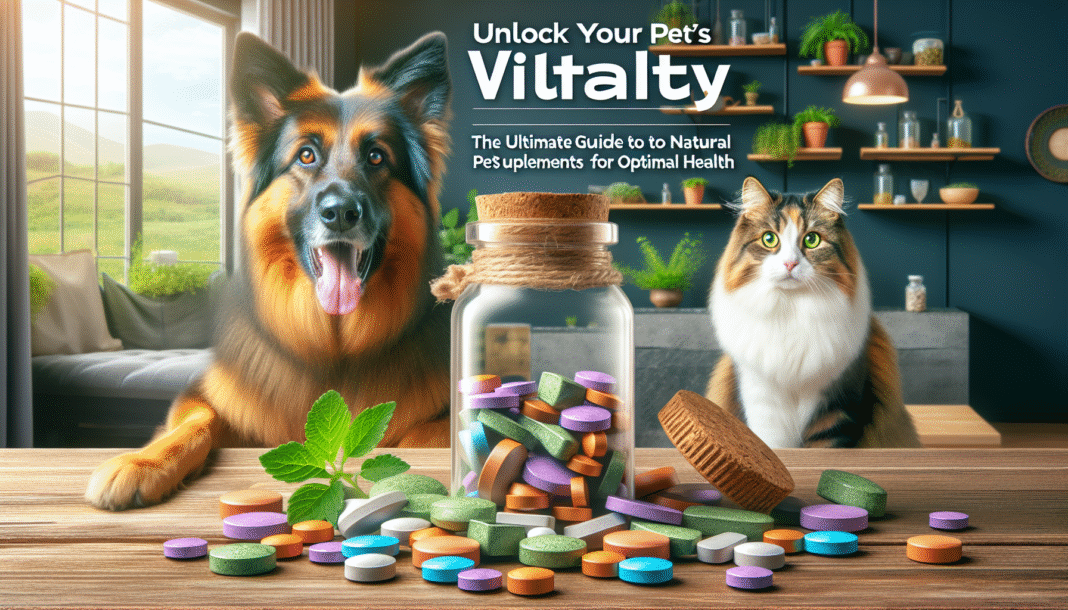As a loving pet owner, you want to provide the best for your furry friend. Just like humans, pets can benefit from natural supplements that support their overall health and well-being. In this guide, we’ll explore various aspects of natural pet supplements, including their benefits, types, and how to incorporate them into your pet’s routine.
Understanding the Need for Natural Pet Supplements
Causes for Supplementation
Pets can face various health challenges due to factors such as age, diet, lifestyle, and environmental conditions. As pets age, they may develop joint issues, skin problems, or decreased energy levels. Young pets may benefit from supplements meant to support their growth and immune system. Additionally, certain breeds are predisposed to specific health conditions, making supplementation an essential aspect of their care.
Symptoms Indicating the Need for Supplements
Identifying symptoms that could benefit from supplementation is crucial. Some common signs that your pet may need extra nutritional support include:
- Low Energy Levels: If your pet seems lethargic or disinterested in activities they once enjoyed, this can be a signal that they could use a boost.
- Poor Coat Condition: Dull, flaky, or thinning fur can indicate a lack of essential fatty acids or other nutrients.
- Joint Pain: If you notice stiffness or difficulty in movement, especially in older pets, joint supplements may be beneficial.
- Digestive Issues: Frequent vomiting, diarrhea, or discomfort can indicate that your pet’s digestive system needs support.
Types of Natural Pet Supplements
Natural pet supplements come in various forms, each designed to target specific health concerns. Here’s a breakdown of the most common types:
1. Joint Supplements
Glucosamine and chondroitin are popular natural ingredients that help maintain joint health and reduce inflammation. These supplements are particularly useful for older dogs and those prone to arthritis.
Tip: Look for formulations made specifically for pets, as human supplements may have dosages that are too high.
2. Probiotics
Probiotics support digestive health by promoting a healthy gut flora. This can help with issues such as diarrhea, gas, and overall digestive discomfort.
Example: Consider adding probiotic supplements with specific strains like Lactobacillus or Bifidobacterium, which are beneficial for pets.
3. Omega-3 Fatty Acids
These supplements, often derived from fish oil, can enhance skin health and coat condition while also providing anti-inflammatory benefits for joints.
Tip: Choose high-quality omega-3 supplements to avoid contaminants and ensure maximum efficacy.
4. Vitamins and Minerals
Multivitamins can fill nutritional gaps in your pet’s diet, especially if they are on a restricted or homemade diet. Key vitamins include Vitamin E, B-complex vitamins, and essential minerals like zinc.
Recommendation: Consult with a veterinarian to determine which vitamins may be most beneficial based on your pet’s specific health needs.
5. Herbal Remedies
Certain herbs can provide added health benefits, such as turmeric for its anti-inflammatory properties or milk thistle for liver support.
Note: Always research specific herbs to ensure they are safe for feline or canine use.
How to Choose the Right Supplement
Consult Your Veterinarian
Before introducing any new supplement, consult with your veterinarian. They can provide tailored recommendations based on your pet’s health, age, and dietary needs.
Check for Quality Assurance
Look for products that have been independently tested for purity and potency. Quality supplements will often carry seals from reputable organizations that ensure good manufacturing practices.
Understand Dosage and Administration
Each supplement may have different dosage guidelines based on your pet’s weight and health status. Familiarize yourself with the proper dosage and how to administer it, whether it’s in the form of a chewable treat, powder, or capsule.
Incorporating Supplements into Your Pet’s Routine
Gradual Introduction
Start by introducing one supplement at a time and monitoring your pet for any changes or reactions. Gradually increase dosage, following the instructions provided.
Pair with Meals
To make supplements more palatable, consider mixing them with your pet’s food. This can also aid in better absorption during digestion.
Monitor and Adjust
Keep an eye on your pet’s health after introducing a supplement. Note any improvements or side effects and adjust or discontinue as necessary in consultation with your veterinarian.
Prevention Through Nutrition
Balanced Diet
A diet rich in high-quality protein, healthy fats, and essential vitamins and minerals is the first step in your pet’s health. Natural supplements should complement a well-rounded diet, not replace it.
Regular Exercise
In combination with supplements, regular physical activity is crucial for maintaining your pet’s vitality. Tailor an exercise routine to your pet’s age, breed, and health status.
Routine Check-ups
Schedule regular veterinary visits to monitor your pet’s health and assess any potential need for supplements.
Keep an Eye on Weight
Maintaining a healthy weight is vital for preventing health issues that may require supplementation. Ensure your pet’s diet and exercise plan aligns with their weight management needs.
Final Thoughts
Natural pet supplements can be a valuable addition to your pet care regime, providing the nutritional support needed for optimal health. By understanding their benefits, types, and how to effectively incorporate them into your pet’s daily routine, you can help unlock their vitality and enhance their overall quality of life. Always remember to consult with your veterinarian for guidance and personalized recommendations that cater to your pet’s unique health needs.

